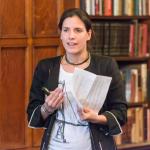Archive
-
Article
What's in a name?
Nov 2, 2011
In the case of utility, it’s all in the name.
-
Article
Nobel Prize Tasseology
Oct 25, 2011
Till is right. It’s not the historian’s task to question the legitimacy of the decisions of the Nobel Committee.
-
Article
“Cause and Effect in the Macroeconomy”
Oct 19, 2011
It’s Nobel Prize time again. And what a beautiful prize this year it is!
-
Article
Bretton Woods, Past and Present: 4. The Teaching of Economics
Oct 1, 2011
This one is different. Tiago, Benjamin and Floris have asked a dozen economists in the Bretton Woods hotel hall to reflect on the way their teaching has been affected by the current economic crisis and their answers, taken collectively, are quite puzzling.
-
Article
Bretton Woods, Past and Present: 3. Models in Economics
Sep 24, 2011
I cannot resist but to start quoting Mary Morgan’s second entry to the second edition of the New Palgrave: “Modeling became the dominant methodology of economics during the 20th century.”
-
Article
Progress in Economics: A Comment
Sep 19, 2011
I thought I could use some of my illegitimate blog administrator’s privileges to participate in the discussion on the “progress in economics” post by Floris without being lost in the midst of other users’ comments.
-
Article
Bretton Woods, Past and Present: 2. Progress in Economics
Sep 17, 2011
Ok, time to deal with the elephant in the room: when is one theory better than the other? What is progress in economics?
-
Article
@Academia and Public, Berlin: Students as model publics
Sep 17, 2011
The transatlantic conference has been moving targets: sociology went first, then economics, then history, today it was political science and international relations.
-
Article
@Academia and Public, Berlin: And then it was all about the history...
Sep 15, 2011
It’s not everyday that one finds economists using history as not just the right way but the only way to answer a question.
-
Article
Bretton Woods, Past and Present: 1. Ethics in Economics
Sep 10, 2011
Our interviews in the halls of the Mount Washington Hotel, covered the range of opinion about the severity of conflicts of interest in economics: we are alright; economics is no more corrupted than other sciences; corruption is substantial; it is rotten to the core.
-
Article
A call to arms for Historians and Economists...
Sep 2, 2011
The Marshall Lectures often provide thought provoking talks and one talk in particular spoke to me looking at the relationship between history and economics:
-
Article
Disaggregate, disaggregate!
Aug 21, 2011
Last June at a History of Social Science workshop , David Engerman presented a paper on the Harvard’s Refugee Interview Project (1950-1954).
-
Article
Warren J. Samuels (1933-2011)
Aug 18, 2011
On this blog, we like to overstate quite a bit our irreverence towards the establishment and in particular our senior colleagues.
-
Article
The long - and tedious - road to rankings
Aug 15, 2011
To celebrate its 100 years of publishing, the AER published a special issues, whose retrospective part consisted of a list of the 20 most important articles, assembled by a committee which included Kenneth J. Arrow, B. Douglas Bernheim, Martin S. Feldstein, Daniel L. McFadden, James M. Poterba, and Robert M. Solow, and an essay on the history of the AER by Robert A. Margo.
-
Article
Of the difference between the historian and the filmmaker
Aug 12, 2011
Months ago, I got a message from a friend that was a swift and excited line: Errol Morris was writing a series of posts about science, even more remarkable about Thomas Kuhn.
-
Article
Economics and Politics
Aug 2, 2011
Economics and politics go hand in hand, we all know that.
-
Article
Who does original research?
Jul 23, 2011
INET is all about thinking new things, and indeed academia is supposed to inspire great thoughts.
-
Article
Paul Samuelson, Women and the History of Economics (Part 2)
Jul 19, 2011
As part of the tremendous promotion campaign for the 8th edition of his textbook Economics, Samuelson was devoted a feature in the New York Times (February 5, 1970, p. 41).
-
Article
Paul Samuelson, Women and the History of Economics (Part 1)
Jul 19, 2011
Paul Samuelson was notorious for many things, but also, like Marshall, for spending most of his academic life in the same institution.
-
Article
When the US last defaulted...
Jul 14, 2011
Two things seem to be taken for granted in the current debt-ceiling debate: 1. The parties will come to an agreement on the debt ceiling because 2. These United States have never defaulted and will not start now.
-
Article
The government and the market
Jul 11, 2011
Mention the government and the market and all academic reflection and civilized discussion dissolves into heated monologues. Politicians are an extreme case.
-
Article
Introducing the Jazz economist
Jul 3, 2011
You would have thought that to be a “jazz economist” was a good thing. I first imagined a “cool cat” that would entrance the hearts and minds of the populace. Not so.
-
Article
HES 2011, Paul Samuelson and the Beatles
Jun 30, 2011
So, how hard is it to write the history of exceptional figures? Shall we buy film cameras?
-
Article
Disdain or paranoia for historians of economics?
Jun 26, 2011
The organizers of Duke’s Summer Institute on the history of economics were so worried that students might be embarrassed to ask their supervisors for a letter of recommendation, or that the supervisors would say it’s a waste of time to study history, so they took a last minute decision to cancel the need for a letter of recommendation.
-
Article
Was Adam Smith a communist?
Jun 22, 2011
In his two-tome, 1400 page Dutch Leerboek der Staathuishoudkunde (Textbook of Economics), first published in 1884, Nicolaas Pierson (1839 - 1909) accuses the great Scotsman of being a communist – or at least of consciously clearing the way for the socialists with their ideal of a communist society.
-
Article
Shocks
Jun 21, 2011
The financial and economic crises started by the fall of Lehman Borthers came as a big shock, a financial shock, an economic shock, a psychological shock, and a political shock among others.
-
Article
A Cold Case
Jun 20, 2011
Some time ago, my colleague and dear friend (nevertheless!) Loïc Charles wrote on the previous version of the Playground, a very nice and intriguing post on Samuelson’s introductory textbook, Economics, and TV Series.
-
Article
These Things Take Time
May 3, 2011
Last week, I spent a few days in the Dalton-Brand Research Room, at Duke University, skimming through the Samuelson papers.
-
Article
In the Archives
Apr 26, 2011
Taking a quick break from my work in the Samuelson archives – so fascinating, believe me! – I can’t resist sharing the following, which I found in his correspondence files.
-
Article
Pop Archives
Apr 20, 2011
I was just amused with two projects by Shaun Usher: to “gather and sort fascinating letters, postcards, telegrams, faxes, and memos” in his blog Letters of Note, and to present interesting letterheads in his Letterheadyblog.
-
Article
Inside Economics
Apr 18, 2011
Charles Ferguson’s Inside Job forces us to fundamentally rethink the connections between economics and policy making.
-
Article
INET and reforming economic education: can history help?
Apr 13, 2011
One INET project is to “reconnect the teaching of economics with the working of the actual economy,” which is to begin with a reform of the undergraduate curriculum.
-
Article
Upon leaving Mount Washington
Apr 13, 2011
The place invites poetry. By the way, all sessions can be viewed from the website – check out in particular the last session featuring Gillian Tett of the Financial Times moderating a discussion between Paul Volcker and George Soros
-
Article
A new K-hero
Apr 12, 2011
I was not in Bretton Woods this week. I followed the event through the videos posted on the INET website and the exhilarating and exhausting experience of Benjamin, Floris and Tiago.
-
Article
When my heart skipped a beat
Apr 10, 2011
I am writing a paper about an economist that was at the Treasury in the second half of the 1950s and 1960s.
-
Article
Who’s the INETiest of them all?
Apr 10, 2011
There are a lot of universities represented here, but who are the most likely candidates for participation and who might one expect INET to be interested in?
-
Working Paper
Conference paperA Tale of Two Trilemmas
Apr 2011
In a classic book and subsequent articles, Obstfeld and Taylor (2004) have shown how the broad contours of international financial history over the past century and a half can be well understood by appealing to the famous economictrilemma which emerges from the standard Mundell-Fleming model many of us still teach our undergraduates.
-
Working Paper
Conference paperA Comprehensive Approach to the Euro-Area Debt Crisis
Apr 2011
The euro area’s sovereign debt crisis continues though significant steps have been taken to resolve it.
-
Conference Session
Optimal Currency Areas and Governance: The Challenge of Europe
Apr 9, 2011 | 09:30—11:30
-
Conference Session
Rising to the Challenge: Equity, Adjustment and Balance in the World Economy
Apr 9, 2011 | 01:50—03:20
-
Working Paper
Conference paperOptimal Currency Areas and Governance: The Challenge of Europe
Apr 2011
In preparing this paper I have decided not to embark upon the decades-old issue of optimal-currency areas and governance as such. I assume that one of my colleagues on the panel will do that. Instead I will present an historical case of over-indebtedness of parts of a common-currency area somewhat similar to the present challenge of Europe, or rather of the Euro area with its common currency.
-
Working Paper
Conference paperHigh Wealth Concentration, Porous Exchange Control, and Shocks to Relative Return: the Fragile State of China’s Foreign Exchange Reserve
Apr 2011
At a time when China is the favored investment destination in the global market, it seems unlikely that it would ever face capital flight.
-
Working Paper
Conference paperLegislators Never Bowl Alone: Big Money, Mass Media, and the Polarization of Congress
Apr 2011
This is a small paper on a big subject: the polarization of American politics since the mid-1970s. In its early stages this process bore more than a passing resemblance to the opening scenes of a Grade B disaster movie: With almost everyone’s attention focused elsewhere, a series of tiny, seemingly insignificant departures from long standing routines took place.
-
Working Paper
Conference paperToo Big to Fail, Too Big to Jail
Apr 2011
The theme of this session is very timely and controversial, on the ability of sovereign governments to supervise Large Complex Financial Institutions (LCFIs), now officially described as G-SIFIs, global systemically important financial institutions.
-
Working Paper
Conference paperGlobal Imbalances: Past, Present and Future
Apr 2011
After the inception and, hopefully, the passing of the most dangerous phase of the international financial crisis, economists have returned to the long favoured subject of global imbalances.
-
Conference Session
The Political Economy of Structural Adjustment: Understanding the Obstacles to Cooperation
Apr 9, 2011 | 03:15—05:10
-
Article
Of history repeating…
Apr 9, 2011
The Bretton Woods conference has a protean character.Talk in the corridors asks “what is it?” Some in the press (lots of press here) believe that deals are being made, the attendance of heavy hitters leads some to believe that consultations and strategies are being outlined for world government (Summers, Stiglitz, Brown, and yesterday Volcker arrived to close the event).
-
Article
Interview with Barry Eichengreen, any requests?
Apr 9, 2011
We have been talking and video interviewing people at the conference, and we’ve narrowed down a small list of questions which we try to build on and have so far talked to Kenneth Rogoff, Brad DeLong, Ha-Joon Chang, Stephen Ziliak, Philippe Aghion, Jean-Paul Fitoussi, Barry Eichengreen and tomorrow we start with James Galbraith.
-
Article
Anglo-Saxons versus the Germans
Apr 9, 2011
For one and a half days we had Anglo-Saxons talking finance and financial crisis: Keynesian stimuli, surplus countries bashing, drawing China in, and bullying of the Euro area and in particular Germany’s role in it.
-
Working Paper
Conference paperEvolving Economic and Financial Systems in India
Apr 2011
The presentation explains that Indian Economy is basically a market-oriented economy with constant rebalancing between state andmarket.
-
Conference Session
The Architecture of Asia: Financial Structure and an Emerging Economic System
Apr 9, 2011 | 11:45—01:35
-
Working Paper
Conference paperCorporate Citizenship in a Civil Economy
Apr 2011
Many companies around the world have discovered they can benefit financially from integrating environmental, social and governance (ESG) targets in their daily operations and strategy.
-
Video
The Challenge of Large, Complex Financial Institutions
Apr 8, 2011
Simon Johnson at the Institute’s 2011 Annual Conference.
-
Conference Session
Can Sovereignty and Effective International Supervision Be Reconciled? The Challenge of Large Complex Financial Institutions
Apr 8, 2011 | 11:05—01:05
-
Conference Session
Sovereignty and Institutional Design in the Global Age: The Global Market and the Nation States
Apr 8, 2011 | 09:00—10:50
-
Conference Session
Bretton Woods: What Can We Learn From The Past In Designing The Future
Apr 8, 2011 | 03:00—04:30
-
Conference Session
Getting Back on Track : Macroeconomic Management After A Financial Crisis
Apr 8, 2011 | 04:50—06:55
-
Conference Session
Gordon Brown: Keynote Address
Apr 8, 2011 | 07:00—09:00
-
Working Paper
Conference paperCambridge Talk on Hayek
Apr 2011
Tonight I will talk briefly about the Keynes-Hayek relationship, then will focus on some of Hayek’s insights that may be of relevance today.
-
Working Paper
Conference paperCombining International Monetary Reform with Commodity Buffer Stocks : Keynes, Graham and Kaldor
Apr 2011
Central to John Maynard Keynes (1941) original Bretton Woods proposal was an international clearing union that would issue a new international currency by fiat called bancor. Among other functions, this international central bank would finance the stabilization of individual commodity prices through commodity buffer stocks.
-
Working Paper
Conference paperThe Keynes Plan, The Marshall Plan And The IMCU Plan; Designing the Future International Payments System using the Past Principles of Keynes's Liquidity Theory and Soros's Reflexivity
Apr 2011
For more than three decades, orthodox economists, policy makers in government and central bankers and their economic advisors, using some variant of old classical economic theory [OCET], have insisted that (1) government regulations of markets and large government spending policies are the cause of all our economic problems and (2) ending big government and freeing markets, especially financial markets, from government regulatory controls is the solutionto our economic problems, domestically and internationally.
-
Working Paper
Conference paperIt May be Our Currency, but It’s Your Problem
Apr 2011
It’s a singular honor to have been asked to deliver the Butlin Lecture. I first met Noel Butlin when I had the pleasure of visiting Australian National University for two months in what was, from my perspective, the summer of 1985.
-
Working Paper
Conference paperCapitalism, Socialism and Democracy, Once Again
Apr 2011
Some questions can only be answered by educated guess. The question at the centre of this round table pertains to this category. We should not be ashamed of this kind of limitation of our capacity to predict the future.
-
Conference Session
The Emerging Economic And Political Order: What Lies Ahead?
Apr 7, 2011 | 11:15—01:00
-
Conference Session
Bretton Woods Conference: Historical Review
Apr 7, 2011 | 02:30—04:30
-
Conference Session
Welcome and Opening Remarks
Apr 7, 2011 | 11:00—11:15
-
Video
How the West is Repeating Japan's Mistakes
Feb 24, 2011
-
Article
Big Money, Mass Media, and the Polarization of Congress
Jan 11, 2011
Paper presented at Bretton Woods Conference
-
Grant
Years granted: 2011Paul Samuelson and the Keynesian Golden Age
This research project develops a much better understanding of Paul Samuelson’s life, work, and broader political-economic vision through archival research at Duke University’s Paul Samuelson archives.
-
Video
Reforming Economic Theory
Apr 22, 2010
Joseph Stiglitz at the Institute’s debut conference in Cambridge, UK (2010).
-
Working Paper
Conference paperPolitical Economy of Controlling Systemic Risk: What Governments Can Do Vs. What Governments Are Willing to Do
Apr 2010
In directing panelists to distinguish between what governments “can” and “will” do, this session’s title frames economic policymaking as a balancing act. Principled efforts to define and pursue the public interest are contested and repeatedly knocked off course by conflictingpersonal, bureaucratic, and political concerns that impinge on government decisionmakers.
-
Working Paper
Conference paperWhen Wolves Cry “Wolf”: Systemic Financial Crises and the Myth of the Danaid Jar
Apr 2010
Financial crises are staggeringly costly. Only major wars rival them in the burdens they place on public finances.
-
Working Paper
Conference paperMarcello De Cecco: Political Economy: What Can Government Do? What Will Government Do?
Apr 2010
The crisis of the export led model in the EMU countries and its monetary and financial consequences on European integration.
-
Conference Session
Political Economy: What Can Government Do? What Will Government Do?
Apr 9, 2010 | 12:15—02:05
-
Working Paper
Conference paperEconomic Policy Challenges in the Post-Crisis Period
Apr 2010
The global financial crisis—and the Great Recession that followed—have inflicted tremendous economic and social damage across the world. Thankfully, we now appear to be on the path to recovery—though it remains sluggish and uneven, and in need of continued policy support in many advanced economies.
-
Conference Session
Dominique Strauss-Kahn: Economic Policy Challenges in the Post-Crisis Period
Apr 9, 2010 | 08:05—09:55
-
Working Paper
Conference paperWhat Kind of Theory to Guide Reform and Restructuring of the Financial and Non-Financial Sectors?
Apr 2010
The purpose of the paper is to argue for attention to be paid, not only to choice of theory, but also to choice of theoretical approach, in order to address issues posed by the crisis.
-
Working Paper
Conference paperRevitalizing Global Economic and Financial Cooperation: Observations on the Global Financial Architecture
Apr 2010
Since the outbreak of the Asian financial crisis more than a decade ago, world leaders have been searching for ways to make the global financial system more resilient, less crisis-prone, and better able to play its essential role in supporting broadly-shared growth.
-
Working Paper
Conference paperToward A New Global Financial Architecture: Some Issues and Approaches
Apr 2010
The current debate on new Global Financial Architecture is, in a way, the continuation of the debate that was intensified consequent upon the Asian crisis.
-
Conference Session
Toward a New Global Financial Architecture
Apr 8, 2010 | 12:00—01:45
-
Working Paper
Conference paperLife after “Rational Expectations”? Imperfect Knowledge, Behavioral Insights and the Social Context
Apr 2010
Many people regard the recent financial crisis as a painful addition to an already massive body of evidence that demonstrates the inadequacy of today’s economic models of “rational” markets.
-
Working Paper
Conference paperAnatomy of Crisis: Economic Theory, Politics and Policy
Apr 2010
The current economic and financial crisis, and it is both, has already imposed great costs on the global economy. Nor is there any guarantee that we have seen the worst and that recovery is now assured.
-
Working Paper
Conference paperGeorge Soros: The Living History of the Last 30 years
Apr 2010
Economic theory has modeled itself on theoretical physics. It has sought to establish timelessly valid laws that govern economic behavior and can be used reversibly both to explain and to predict events.
-
Conference Session
Anatomy of Crisis- The Living History of the Last 30 Years: Economic Theory, Politics and Policy
Apr 8, 2010 | 03:00—04:50
-
Conference Session
What Kind of Theory to Guide Reform and Restructuring of the Financial and Non-Financial Sectors?
Apr 8, 2010 | 09:50—11:40
-
Webinars and Events
The Economic Crisis and the Crisis in Economics
PlenaryNew Economic Thinking 2010
Apr 8–11, 2010
The Institute for New Economic Thinking convened many of the world’s most distinguished economists, academics and thought leaders at its inaugural Conference at King’s College, University of Cambridge.
-
Working Paper
Conference paperInterpreting the Great Depression: Hayek versus Keynes
Apr 2010
This is not intended to be a purely historical paper. I am interested in the light the Keynesian and Hayekian interpretations of the Great Depression throw on the causes of the Great Recession of 2007-9 and in the policy relevance of the two positions to the management of today’s globalizing economy.
-
Conference Session
1930 and the Challenge of the Depression for Economic Thinking
Apr 7, 2010 | 03:00—05:00
-
Course
Markets, Speculation and the State
William Janeway’s Far-Ranging Seminar on Fundamental Debates in Innovation and Finance
-
Course
Capitalism: Competition, Conflict and Crises
The aim of the two-semester sequence is to explore a coherent alternative to neoclassical and post-Keynesian theory that does not rely in any way on concepts of utility maximization, rational choice, rational expectations, or perfect/imperfect competition.
-
Course
After the Crisis
Many thought the financial crash was a final blow to capitalsim. Why does it still reign supreme? Anatole Kaletsky outlines the shape of things to come.
-
Person
Andrew Sheng
 Distinguished Fellow, Asia Global Institute
Distinguished Fellow, Asia Global Institute -
Person
Adair Turner
 Senior Fellow Senior Fellow, Centre for Financial Studies (Frankfurt) Senior Fellow and Grantee, INET Chair, Energy Transitions Commission Former Chairman, United Kingdom Financial Services Authority
Senior Fellow Senior Fellow, Centre for Financial Studies (Frankfurt) Senior Fellow and Grantee, INET Chair, Energy Transitions Commission Former Chairman, United Kingdom Financial Services Authority -
Person
Beatrice Cherrier

-
Person
Brad Delong
 Professor, U.C. Berkeley Department of Economics Economic historian with expertise in the nineteenth and twentieth-century North Atlantic; macroeconomist with expertise in the history of economic thought; and ex-senior Treasury Department official with expertise in public policy and information-age dialogue.
Professor, U.C. Berkeley Department of Economics Economic historian with expertise in the nineteenth and twentieth-century North Atlantic; macroeconomist with expertise in the history of economic thought; and ex-senior Treasury Department official with expertise in public policy and information-age dialogue. -
Person
Collin Constantine
 Coordinator, YSI Economic Development Working Group Kingston University Collin Constantine is a Ph.D. Candidate in Economics at Kingston University and works on Economic Development & Growth, Open Economy Macroeconomics, Distribution and Political Economy.
Coordinator, YSI Economic Development Working Group Kingston University Collin Constantine is a Ph.D. Candidate in Economics at Kingston University and works on Economic Development & Growth, Open Economy Macroeconomics, Distribution and Political Economy. -
Person
Cecilia Rikap
 Associate Professor in Economics, IIPP - University College London. Consejo Nacional de Investigaciones Científicas y Técnicas (CONICET). COSTECH, Université de Technologie de Compiègne Cecilia Rikap is a Head of Research and Associate Professor in Economics at the UCL Institute for Innovation and Public Purpose (IIPP).
Associate Professor in Economics, IIPP - University College London. Consejo Nacional de Investigaciones Científicas y Técnicas (CONICET). COSTECH, Université de Technologie de Compiègne Cecilia Rikap is a Head of Research and Associate Professor in Economics at the UCL Institute for Innovation and Public Purpose (IIPP). -
Person
Coen Teulings
 Co-Director, Cambridge-INET Institute
Co-Director, Cambridge-INET Institute -
Person
Ingrid Harvold Kvangraven
 Lecturer in International Development, King’s College, London Member, INET Young Scholars Initiative
Lecturer in International Development, King’s College, London Member, INET Young Scholars Initiative -
Person
Sunil Amrith
 Mehra Family Professor of South Asian Studies, Harvard University Professor of History, Harvard University Director, Joint Center for History and Economics
Mehra Family Professor of South Asian Studies, Harvard University Professor of History, Harvard University Director, Joint Center for History and Economics